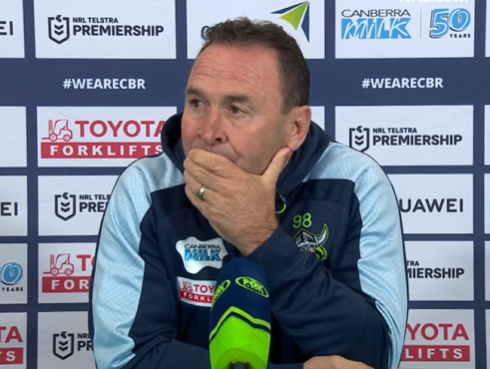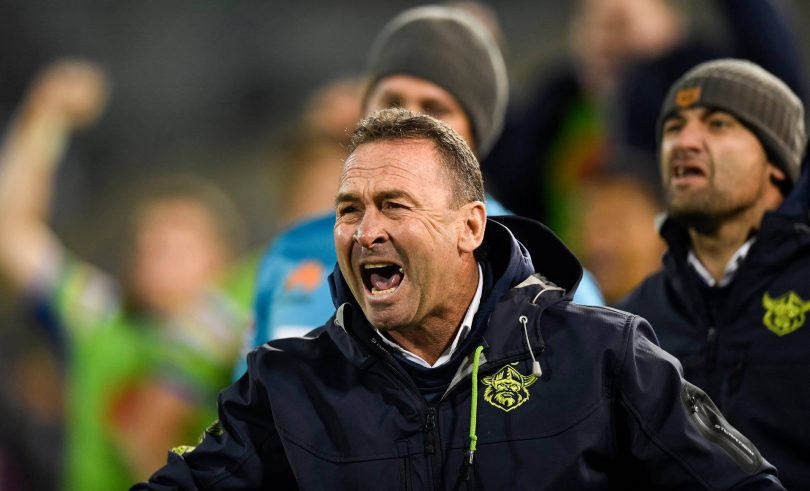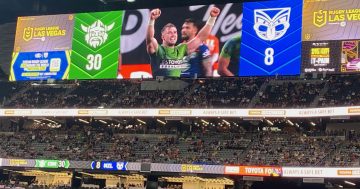
Ricky Stuart after his team’s 44-16 Round 12 loss to the Roosters. Photo: Screenshot.
Having participated as a journalist in thousands of post-match press conferences, I can testify the experience can be incredibly uncomfortable for all involved.
In the NRL, there is a rule that both head coaches front the media while players are made available where possible. An obvious exception is when players are being treated for an injury.
The losing coach’s press conference is, at times, akin to pulling teeth. Journalists tentatively scan the room to determine who will ask the first question.
I have been in this situation many times, and there is a sense of manufactured confidence as you draw strength to ask that first question knowing full well that there is a distinct possibility that it will be shot down in flames.

Ricky Stuart is an active participant in the performance of the Raiders. Photo: Supplied.
After a loss, a post-game press conference with Ricky Stuart can be particularly tough given how hard he takes it.
He has been fined more than $120,00 in his coaching career for breaching the NRL’s media policy or for comments made in a press conference.
There is almost a sense of anticipation among television viewers, particularly after a controversial loss. These days, coaches are well aware of the financial penalties and use their words wisely, often going out of their way to say they are not challenging the integrity of match officials.
It makes for great theatre as journalists walk a delicate line in a bid to secure a quote.
While it may make for great drama, it can be the most awkward of experiences. Thankfully, many barely last a minute, although it feels like an hour.
From memory, Ricky’s shortest media conference came in 2015 after a loss to the Broncos. It lasted about 24 seconds, during which he aired his frustration with the referees. He was fined $20,000.
There are plenty of examples in which the awkwardness of post-match media conferences is there for all to see. For fans, it is the closest insight into what is happening behind the scenes.
But is it right to intrude at these vulnerable times?
Japanese tennis player Naomi Osaka has announced that she is boycotting post-match media conferences because they affect her mental health.
If she continues with her boycott, Osaka could be banned from future Grand Slams – the French Open, the Australian Open, the US Open and Wimbledon.
After boycotting post-match media following her first-round win at the French Open, Osaka announced that she was pulling out of the tournament before the second round.
Her stance has ignited a debate on the worth of post-game media conferences, particularly involving losing players or coaches when their pain is displayed so publicly.
Osaka stated that she experiences waves of anxiety before media conferences and that she has a history of depression.
This creates a dilemma for professional sportspeople and their sport.
There is, of course, a reason for media conferences as the sporting public demands greater insights into the thoughts and personalities of players and coaches. It is seen as being crucial to the promotion of the sport. It is part of the ‘product’ of sport, and the players and coaches are major actors within that product.
It had become a vital ingredient in the matchday program and is considered when television and media rights are negotiated. In turn, this leads to more money coming into the game, resulting in higher salaries.
But at what cost to the mental health of athletes and coaches? It is time to re-think the obligation on losing coaches and players, in particular, to front the media. If coaches and players are okay to do it, fair enough, but being forced to do it is archaic.
Original Article published by Tim Gavel on The RiotACT.







